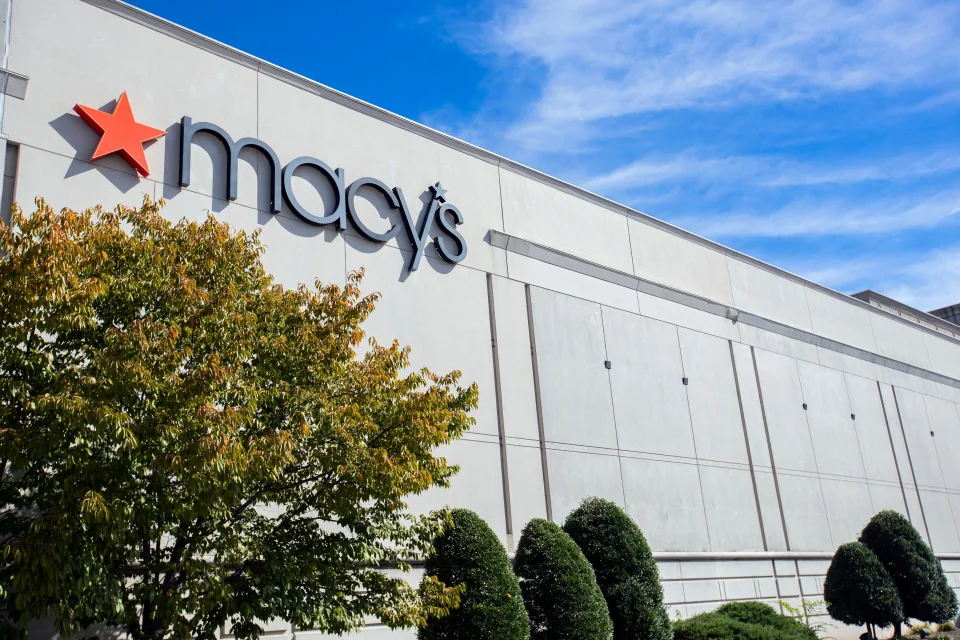Macy’s (M:NYSE) is saying goodbye to about 150 stores. The department-store operator said that the stores, which have mostly in under-performing locations would be closed over the next three years as part of its latest turnaround effort.
The company will focus on upgrading its remaining 350 Macy’s stores, while also opening smaller versions of its namesake chain and adding Bloomingdale’s and Bluemercury locations. The company also put its San Francisco flagship location up for sale.
Macy’s shares lost 7.1% this week.
Zoom zooms higher
Zoom (ZM:NASDAQ) forecasted a higher-than-expected adjusted profit this year. The unexpected quarterly performance was boosted by an increase in sales of its artificial intelligence services, Zoom AI Companion, which was launched last September.
For the current fiscal year, the company projected $4.6 billion in revenue, which would amount to 2% growth. The videoconferencing company also announced plans to buy back up to $1.5 billion of stock.
However, Zoom’s positive expectations for growth in 2024 are dwarfed by the headier days of 2020 and 2021. The pandemic-era darling’s performance has been sluggish since lockdown restrictions eased and the world transitioned back into in-person work.
Zoom shares finished the week 11.3% higher
Super Micro joins S&P 500
Super Micro Computer (SMCI:NASDAQ) is joining the S&P 500 following a historic rally in the stock that has pushed the company’s market cap past $50 billion. The comany would be replacing Whirlpool in the benchmark index.
Super Micro has been one of the main beneficiaries of the artificial intelligence boom sweeping the technology industry. The company makes servers and other computer infrastructure, and it’s one of the primary vendors for building out Nvidia-based “clusters” of servers for training and deploying AI models
Super Micro shares are up more than 20-fold in the past two years and over 200% just since the start of 2024. The company’s shares ended the week 2.3% higher
Dell has best day since 2018
Dell (DELL:NYSE) had its best day since founder and CEO Michael Dell brought the company back to the stock market in 2018.
Shares of the PC and server manufacturer surged 31% on Friday to $124.59, after the company posted fiscal fourth-quarter results that beat estimates. That tops the stock’s 21% gain from Sept. 1, which followed a better-than-expected earnings report.
For the latest quarter, Dell reported revenue of $22.32 billion, down 11% from the year-ago quarter but eclipsing the $22.16 billion analysts were expecting,
Dell returned to public markets in 2018 after going private in 2013. Its market cap was about $16 billion when it first started trading more than five years ago. It’s now worth close to $86 billion.
Dell shares ended the week 35% higher.
Alphabet’s AI problems give investors mixed spells
Shares of Google 9GOOG:NASDAQ) fell this week amid renewed fears that Alphabet’s missteps in artificial intelligence are putting its search business at risk. Google shares shed more than $70 billion from its market value on Monday as the stock fell 4.4%.
The share drop followed Google’s pause of its image generation feature which drew criticism over inaccurate historical depictions of race. Google has acknowledged inaccuracies in image generation depictions of people and said it’s addressing the problems.
Problems with AI tools are fuelling the perception that Google is an unreliable source for AI. This would create opening for competitors to gain market share in the already sizzling hot AI space.
Google shares finished the week 5.2% lower, and is negative for the year.
Uber CEO receives big payout
Uber (UBER:NYSE) chief executive Dara Khosrowshahi has received options to buy stock worth about $136mn after hitting a performance target to secure a $120bn valuation for the ride-hailing company.
Khosrowshahi was hired in 2017 from Expedia, where he was once the best-paid chief executive in the S&P 500. To compensate him for $160mn in options he gave up on leaving Expedia.
The award, set before Uber’s 2019 public offering, had looked unlikely to be met as the ride-hailing company struggled with persistent losses that ran into the tens of billions of dollars.
Since taking over, Khosrowshahi has cut costs to boost margins, offloaded non-core businesses such as autonomous vehicles, and found revenues in new areas such as advertising.
Uber shares finished the week 4.22% higher.

